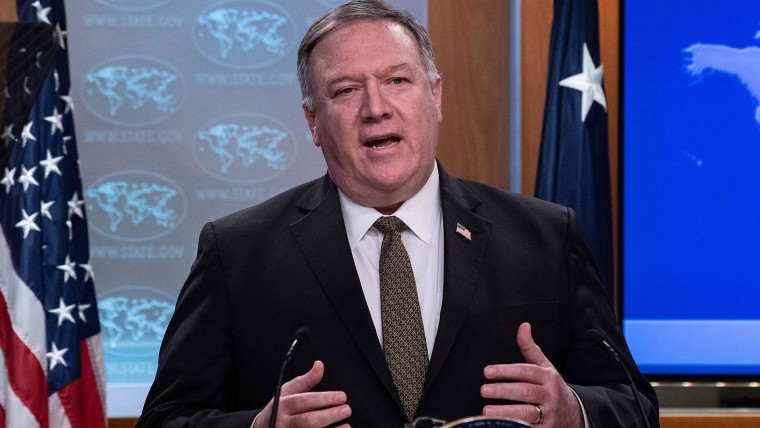As the blame game about the coronavirus pandemic continues to heat up between the United States and China, senior Chinese officials have taken to English language social media platforms to both fend off and make accusations about its spread.
Although Twitter is blocked in his homeland, Hu Zhaoming spokesman of the International Department of the ruling Communist Party, joined it last month. He has since become a vocal member of the microblogging site, posting a series of pointed tweets about President Donald Trump and the response to the virus in Europe and other countries.
China's ambassadors from France to South Africa have also utilized official embassy accounts to respond to criticism that their homeland had been too slow in its initial response to the virus, which originated in the city of Wuhan late last year. So far, the virus has killed more than 269,000 people globally, according to Johns Hopkins University data.
Some Chinese officials also posted the theory that the deadly virus may have been brought into Wuhan by American athletes when they competed at the Military World Games there last October — something U.S. officials have vehemently dismissed as "disinformation" and "crazy talk."
Then last week, a slick, animated video published and distributed by Chinese state media, entitled "Once upon a virus" was widely shared online. Featuring a Lego-like terra-cotta warrior representing China and a Statue of Liberty for the U.S., the pair traded barbs on COVID-19.
"We have discovered a new virus," the warrior says. "So what?" Lady Liberty replies.
The satirical video goes on to criticize America's "inconsistent" approach to the pandemic, while implying that Chinese warnings about the virus went unheeded.
It is one example of how China has become "much more assertive" and confident in putting forward its view into the wider public sphere, Rana Mitter, a professor and the director of the University of Oxford China Centre, told NBC News.
“It’s quite a shrewd move," he said. Although it omitted Chinese shortcomings, he added, it did "pick away at anxieties that already exist" in relation to the U.S. handling of the pandemic.
Let our news meet your inbox. The news and stories that matters, delivered weekday mornings.
Mitter added that the use of social media to convey a state's message was not unique to China and had also been practiced by Russian embassy accounts in the past.
While not producing satirical videos, Trump, a well-known tweeter, has shifted from initially praising China's handling of the outbreak to sharply criticizing it, as the threat the pandemic poses to the U.S. economy and his re-election prospects has crystallized.
But this week, Secretary of State Mike Pompeo has been leading the online and offline criticism.
"The Chinese Communist Party continues to block access to the Western world, the world's best scientists, refusing to cooperate with world health experts, to figure out exactly what happened," he tweeted Sunday, without elaborating on what the evidence was. "This is unacceptable during an ongoing threat, an ongoing pandemic."
He followed this up by suggesting that there was "enormous evidence" that the virus originated at the Wuhan Institute of Virology, during an appearance on ABC's "This Week" on Sunday. On Wednesday, he told a news conference that China could have prevented the deaths of hundreds of thousands of people worldwide had it not "covered up" the outbreak in the city.
"The next time that a calamity like this hits, we need reliable partners. As a result of China's choices, countries are starting to understand the risk of doing business with the Chinese Communist Party," he said.
His comments were met with a wave of anger from Chinese officials, much of it online.
During a webinar livestreamed Tuesday, China's ambassador to Britain insisted there had been "no cover-up" and "no hiding at all," by Beijing.
Without naming names, Liu Xiaoming said that some U.S. politicians "were busy with spreading rumors and slanders," while turning a blind eye to China’s "enormous efforts, sacrifice and contribution."
He added that they wanted to "pass the buck" for the slow U.S. response to the virus.
Pompeo's comments were met with a less tempered response from Chinese Foreign Ministry spokesperson Hua Chunying on Wednesday, who took to Twitter to accuse the U.S. of "pressuring other countries in a smear campaign against China."
Hua tweeted: "The choice is NOT between the US and China, but between LIES & FACTS, bullying & cooperation, unilateralism & multilateralism."
As finger-pointing grows in the race to influence global opinion, it is not just the U.S. but Europe too tussling over narratives with China.
On Thursday, the European Union's ambassador to China warned that rising Sino-U.S. tensions were problematic for everyone and undermined the global cooperation needed to deal with the pandemic.
The EU also faced criticism after part of an opinion piece co-authored by 27 European ambassadors — to mark the 45th anniversary of diplomatic relations between the EU and China — was published in the official China Daily newspaper, with a sentence removed before publication that referred to China as the place where the outbreak began.
It was "regrettable that part of the sentence about the spread of the virus has been edited," Nicolas Chapuis, the EU's China ambassador told reporters at a briefing on Thursday. The original op-ed has been published on the EU's official website.
But Mitter warned the online war of words was something we'll likely see more of as China uses different tools and methods to win influence — some "traditional and low-key" and others "unprecedentedly much more assertive" to achieve its diplomatic goals.
Reuters contributed to this report.
Mo Abbas, Janis Mackey Frayer, Ed Flanagan, Jean-Nicholas Fievet, Dawn Liu, Eric Baculinao and Abigail Williams contributed.
World - Latest - Google News
May 08, 2020 at 03:56PM
https://ift.tt/35EJmxs
Angry tweets and mocking videos: China attempts to shape coronavirus narrative online - NBC News
World - Latest - Google News
https://ift.tt/2SeTG7d
Bagikan Berita Ini


















0 Response to "Angry tweets and mocking videos: China attempts to shape coronavirus narrative online - NBC News"
Post a Comment